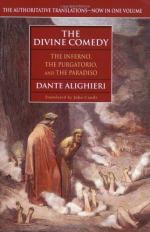She spake; and I replied: “I know not how
To reconcile this wave and rustling sound
Of forest leaves, with what I late have heard
Of opposite report.” She answering thus:
“I will unfold the cause, whence that proceeds,
Which makes thee wonder; and so purge the cloud
That hath enwraps thee. The First Good, whose
joy
Is only in himself, created man
For happiness, and gave this goodly place,
His pledge and earnest of eternal peace.
Favour’d thus highly, through his own defect
He fell, and here made short sojourn; he fell,
And, for the bitterness of sorrow, chang’d
Laughter unblam’d and ever-new delight.
That vapours none, exhal’d from earth beneath,
Or from the waters (which, wherever heat
Attracts them, follow), might ascend thus far
To vex man’s peaceful state, this mountain rose
So high toward the heav’n, nor fears the rage
Of elements contending, from that part
Exempted, where the gate his limit bars.
Because the circumambient air throughout
With its first impulse circles still, unless
Aught interpose to cheek or thwart its course;
Upon the summit, which on every side
To visitation of th’ impassive air
Is open, doth that motion strike, and makes
Beneath its sway th’ umbrageous wood resound:
And in the shaken plant such power resides,
That it impregnates with its efficacy
The voyaging breeze, upon whose subtle plume
That wafted flies abroad; and th’ other land
Receiving (as ’t is worthy in itself,
Or in the clime, that warms it), doth conceive,
And from its womb produces many a tree
Of various virtue. This when thou hast heard,
The marvel ceases, if in yonder earth
Some plant without apparent seed be found
To fix its fibrous stem. And further learn,
That with prolific foison of all seeds,
This holy plain is fill’d, and in itself
Bears fruit that ne’er was pluck’d on
other soil.
“The water, thou behold’st, springs not
from vein,
As stream, that intermittently repairs
And spends his pulse of life, but issues forth
From fountain, solid, undecaying, sure;
And by the will omnific, full supply
Feeds whatsoe’er On either side it pours;
On this devolv’d with power to take away
Remembrance of offence, on that to bring
Remembrance back of every good deed done.
From whence its name of Lethe on this part;
On th’ other Eunoe: both of which must
first
Be tasted ere it work; the last exceeding
All flavours else. Albeit thy thirst may now
Be well contented, if I here break off,
No more revealing: yet a corollary
I freely give beside: nor deem my words
Less grateful to thee, if they somewhat pass
The stretch of promise. They, whose verse of
yore
The golden age recorded and its bliss,
On the Parnassian mountain, of this place
Perhaps had dream’d. Here was man guiltless,
here
Perpetual spring and every fruit, and this
The far-fam’d nectar.” Turning to
the bards,
When she had ceas’d, I noted in their looks
A smile at her conclusion; then my face
Again directed to the lovely dame.




